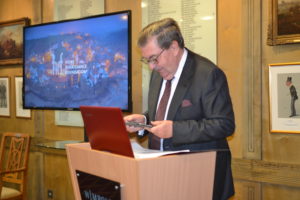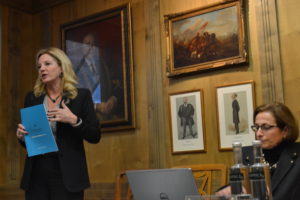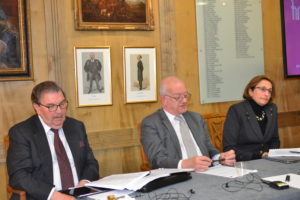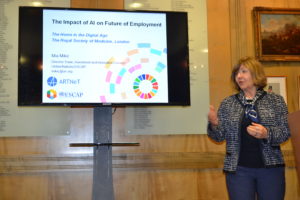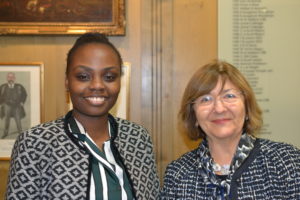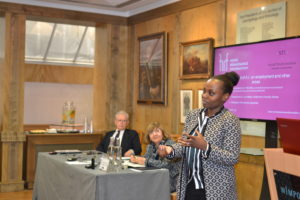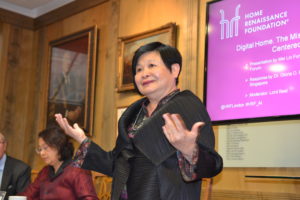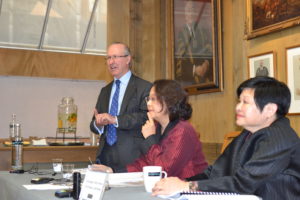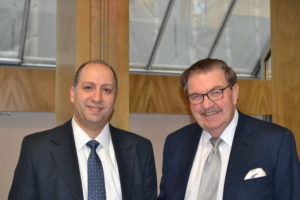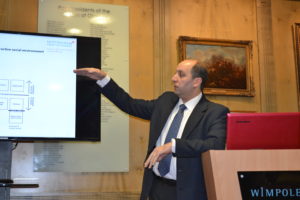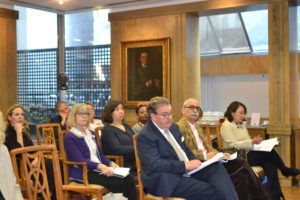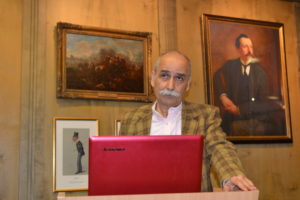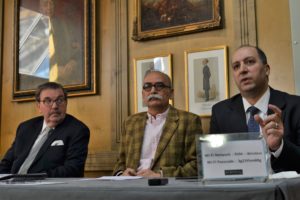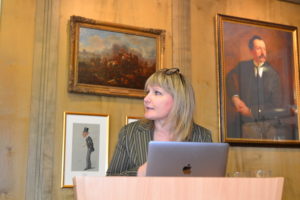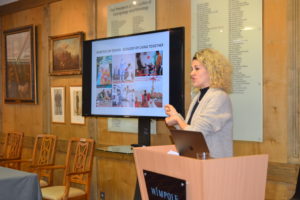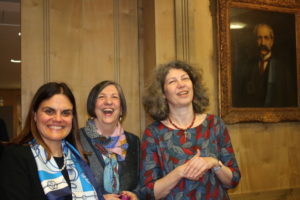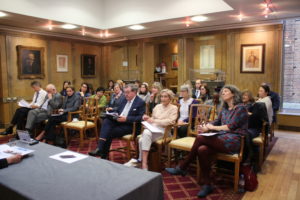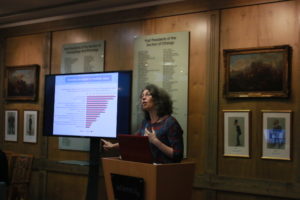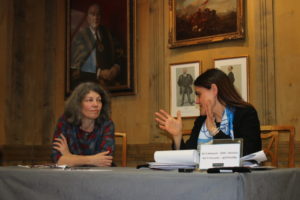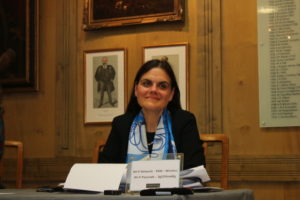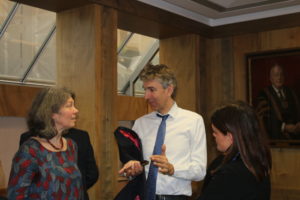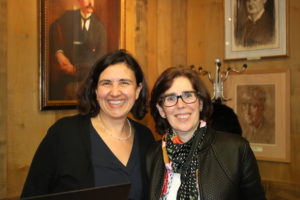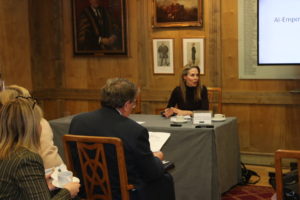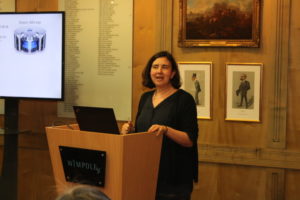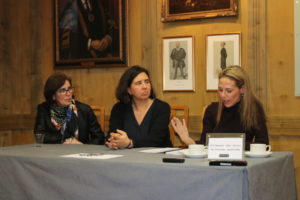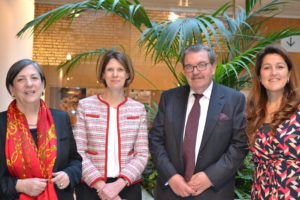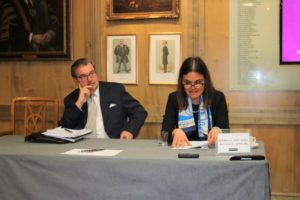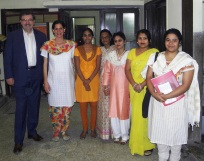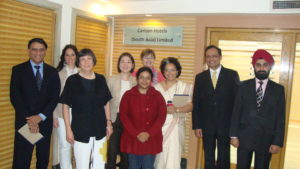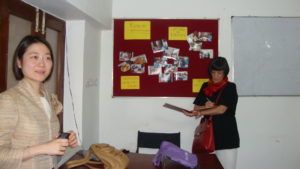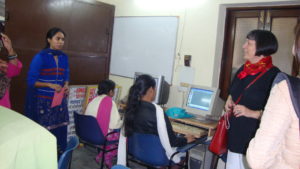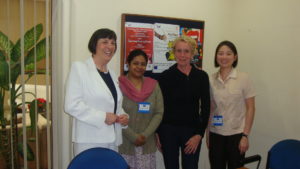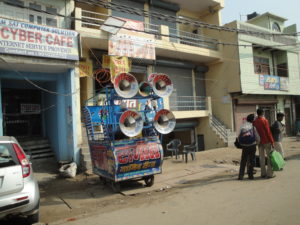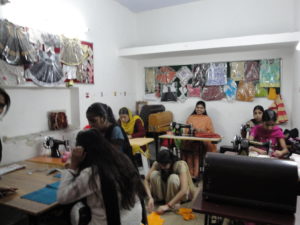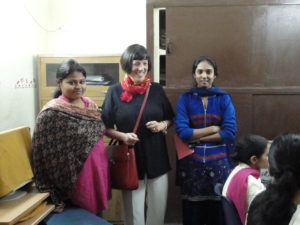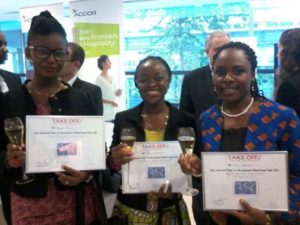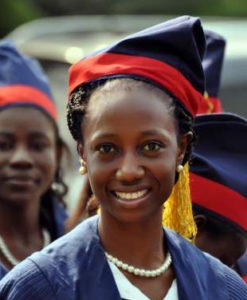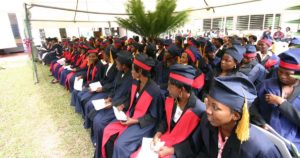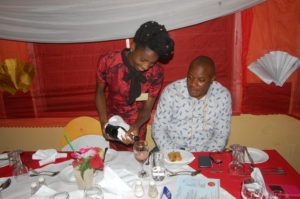The Home in the Digital Age | London
25-26 February 2019 | At The Royal Society of Medicine, London
How are the new technologies changing our homes, our lives, our relationships?
The focus of this third Experts Meeting was on the contribution of Artificial Intelligence and the new technologies to the life and work of the home – “The Home in the Digital Age.”
Paper givers and respondents were distinguished academics and professionals working in the area of AI. The focus of the meeting was to address, among other related questions:
- How are these new technologies changing the perception of our bodies, our biographical perception and social relationships?
- What are the new factors in play and how can they be employed to serve the ends that we consider worth preserving in the case of the home and household?
- What might be the specific benefits and the specific costs of how the new technologies can enhance children’s growth, their social integration, intergenerational relationships in the domestic environment, and the care of the elderly?
Details of paper givers, respondents and proposed papers:
Professor Luisa Damiano | Associate Professor. University of Messina, DICAM, Department of Ancient and Modern Civilizations
Respondent: Dr Ioana Ocnarescu, Strate Ecole de Design, Paris
Focus: Homes as connectors: modelling living spaces in the era of human-robot co-evolution
Mei-Lin Fung | Co-founder with Vint Cerf of the People Centered Internet, World Economic Forum
Respondent: Dr Gloria O. Pasadilla Senior Analyst, APEC Policy Support Unit in Singapore
Focus: Digital Home – Recognize the Perils and Realize the Promise
Professor Gamal Abdelmonem Director, Centre for Architecture, Urbanism and Global Heritage (AUGH). Nottingham Trent University, UK
Respondent: : Homayoun Alemi, Architect. RIBA.
Focus: Contested Homes in the Age of the Cloud: The changing socio-spatial dynamics of family living and care in the 21stcentury
Professor Francesca Toni | Leader of Computational Logic and Argumentation, Imperial College, London
Respondent: Professor Matilde Santos. Complutense University, Madrid
Focus: Survey of AI for the home and society at large
Dr Mia Mikic | Director Trade, Investment and Innovation Division. United Nations Economic and Social Commission for Asia and the Pacific, Bangkok
Respondent: Dr Joy Malala, Strathmore University, Kenya
Focus: The impact of A.I. on employment
Dr Stephen Davies | Head of Education at the Institute of Economics Affairs (IEA), London
Respondent: Professor Sophia Aguirre, Catholic University of America, Washington DC
Focus: AI, automation & the home
Key Note and Q&A: Digital families: grand hopes, growing fears, everyday struggles
Professor Sonia Livingstone OBE FBA, London School of Economics, UK
Q&A Facilitator: Professor Rosa Lastra
The tried and tested format of the Experts’ Meeting hosted by HRF with the generous support of STI, allowed for a high level of presentation and discussion on this very topical and relevant area to both individuals and society – it all starts in the home.
A brief history of the Quality of Life: its use in medicine and in philosophy
Since the early 1970s, interest in the quality of life (QoL) concept has increased significantly in clinical practice and research. QoL has been of paramount importance for evaluating the quality and the outcomes of health care. Despite its importance, there is still no consensus on the definition or proper measurement of QoL. The purpose of this article is to analyze how QoL is being used in medicine and in philosophy to understand its current status.
The term QoL began to be used in the early 1960s following changes in the health and the demographic profiles of “late modern” societies. Traditionally, public health has been concerned, not to say preoccupied, with mortality. Public health frameworks in the first half of XX century were developed and articulated to help cope with the complex patterns of “premature” mortality, and, to a lesser extent, the incidence and prevalence of morbidity. In other words, medicine focused its attention on quantity of life.
Kamalini Vocational Training Centre
The Kamalini Vocational Training Centre, an initiative from Protsahan Charitable Trust, is an institute dedicated to preparing young women to support themselves and better manage their own homes in a secure and well-located area in New Delhi, India.
Home Renaissance Foundation has been working with Protsahan Charitable Trust on this project since 2009 to promote quality-focussed and service orientated vocational training. A recent visit by HRF’s Executive Director, Mercedes Jaureguibeitia and Projects Associate, Charlene Ching saw the progress this initiative has made since the collaboration, including the development of the existing centre as well as the plot where a new training centre will be built. This new training centre will also include a hospitality training centre.
The campus is envisaged to be a model project in human ecology where recycling and harvesting solar energy and saving water will be encouraged to maximise the use of natural light and minimise energy requirements.
The Centre has grown consistently and now runs two vocational training centres in urban villages of Delhi while main compound offers courses with two main objectives:
- To supplement basic education through Open School, Tuitions, English language.
- To impart training in skills to facilitate employment and improve the quality of life at home
Kamalini also provides vocational training courses in cutting and tailoring, basic computers and nutrition, cooking and housekeeping.
While paid staff members provide the core education for the students, Kamalini also accepts volunteers to provide personal encouragement and coaching to the students and teaching short courses. Volunteers are offered periodic leadership workshops, and student volunteers are able to fulfil their National Social Service community service hours at the project.
For further information on the Kamalini Vocational Training Centre or to donate or volunteer, you can visit their website
Wavecrest College
Wavecrest College of Hospitality is a project of the not-for-profit Women’s Board, Educational Cooperation Society of Nigeria.
This project offers women education and training in the areas of hospitality and tourism and hopes to create an awareness of the impact of hospitality services on the quality of life of the individual, the family and ultimately on the development of society. Home Renaissance Foundation has been involved with Wavecrest since 2007.
Wavecrest offers academic training from Certificate to Higher National Diploma level on Hospitality Operations and Hospitality Management. Shorter training courses are also offered in Hospitality Training, Culinary Training and Professional Home Management.
For further information on Wavecrest College of Hospitality and their courses, please visit their website.
Launch of the British Report of the Global Home Index | House of Commons
Launch of the Global Home Index | United Nations
Argentina, Uruguay, Chile, Paraguay, Peru, Dominican Republic and Ecuador were the first countries where the HRF and our two main partners presented the first report of the Global Home Index.
Last May, we were launching the results at the United Nations where Professor Patricia Debeljuh discussed the findings which you can find here.
This first report is a comparative study of 20 countries. The main objective was to evaluate how the amount of work required to build and care for healthy, thriving home environments is understood and valued.
If you have not yet completed it, please click here to participate, as your views make a valid contribution to society.
Policy Events
bla bla
BeHome Blog
This blog is Home Renaissance Foundation’s loud-speaker for fostering a renewal of the culture of the home in society, together with the responsibility of families in caring for the young and the elderly.
The BeHome blog maintains that the home is the place where individuals grow and develop, so it is in society’s best interest to look after it. Concerned that sometimes the world outside the home may absorb us completely that the home and the work of the home will become unimportant, the Foundation found that interesting and effective content on the blog was worthwhile channel for catalysing recognition of the home.
All articles, interviews and news on the BeHome blog show the ‘professional’ vision we give to the home and a firm belief that a professional approach to housework can enhance the wellbeing of present and future generations. Therefore we also assert that homemakers, whether stay-at-home or working parents, deserve better as they are crucial in creating a good home environment and thus happy families.
Home Renaissance Foundation’s Media Relations team is increasing the impact of the blog. Joanna Roughton is putting her extensive experience in journalism as Senior Editor at Reuters in Hong Kong and Singapore, and Head of Foreign News at Sky News in London in helping the organization spread its important message. Rosemary Roscoe is putting her experience as journalist and mother in… Angela de Miguel a Spanish radio journalist and digital consultant is updating the current affairs on the blog and on social media.
SMART
- What is SMART?
SMART Home Management Course fills the vacuum and provides the skills needed to run an enriching home. The migration of women to the work place, the changing priorities in managing a home, and the limited time available have created the need for further knowledge and skills to revitalise the home.
- Why and when was it born?
In 2012 a group of mothers became aware of the need for homemakers to see their role as a profession, and of the urgency for developing the skills necessary to become competent and to avoid being overwhelmed by the work of the home. To this end, SMART Home Management was set up to provide holistic courses that offer training in every aspect of the home, from family relationships to de-cluttering a room.
- Content of the courses
SMART courses provide the life skills needed to run a home successfully. The short courses offered are:
– Time Management
– Budgeting
– Nutrition and Meal Planning.
– Maintenance and Cleaning
– Communication, relationships and roles within the home.
– Creativity in the home.
By the end of the SMART Home Management programme you will:
– Possess the skills necessary to enrich your home-life.
– Reduce your weekly outgoings in all areas of running the home.
– Organise your day to have more time for you and your family.
– Be able to deal with unexpected situations calmly and efficiently.
– Improve your relationship with all members of the family.
- Since then…
The SMART Project has provided coaching and training to 20 mentors; and a total of 315 women have participated in the SMART workshops, learning new skills as well as how to apply these in their own homes and in the wider community.
Testimonials
SMART Home Management has a great impact on many homes by raising the standards of the home and enhancing the well-being of those who live there.
- “It has saved my marriage, thank you very much. I say this for two reasons: I am meeting the important needs of my family without stress, and this in turn is providing the basis for peaceful relationships at home” . (Croydon)
- “This is an innovative course; nobody has given me this insight before, and I am hoping it will bring a new dimension to my everyday family life”. (Aylesbury)
- “I have learned how to economise and thus to maximise my budget – which is not big. This has been of particular relevance at a time when my husband is out of work.” (London)
- “The course is very good for a number of reasons. It is given by down-to-earth coaches who don’t just read out the slides but instead expand on things, giving examples and handy hints at every step. This also enables further discussion of the topic afterwards in an open and relaxed manner. A social event with fantastic food”. (Manchester)
WEBSITE HERE: www.smarthomemanagement.org
